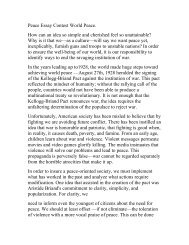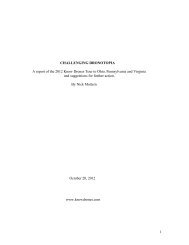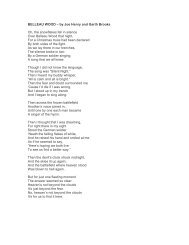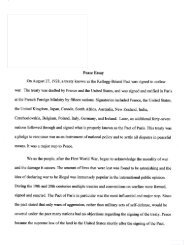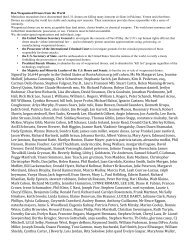US Training of Death Squads in Iraq? - War Is A Crime .org
US Training of Death Squads in Iraq? - War Is A Crime .org
US Training of Death Squads in Iraq? - War Is A Crime .org
You also want an ePaper? Increase the reach of your titles
YUMPU automatically turns print PDFs into web optimized ePapers that Google loves.
In the face <strong>of</strong> grow<strong>in</strong>g criticism over its <strong>Iraq</strong> policies, the current adm<strong>in</strong>istration hasacknowledged mistakes such as <strong>in</strong>accurate prewar claims <strong>of</strong> Saddam's military capability and<strong>in</strong>adequate policies to address post-<strong>in</strong>vasion stabilization. However, these statements appearcalculated to defend the ongo<strong>in</strong>g U.S.-led war rather than to admit fault. Though Bush'sacceptance <strong>of</strong> ultimate responsibility for the failures <strong>of</strong> U.S. policy is a positive step, no one hasyet been held accountable for these errors.For example, the president says he was “responsible for the decision to go <strong>in</strong>to <strong>Iraq</strong>.” Yet hedefends that decision, even though the <strong>in</strong>vasion was a clear violation <strong>of</strong> the United NationsCharter and was based upon false claims that <strong>Iraq</strong> already disarmed <strong>of</strong> <strong>of</strong>fensive militarycapabilities by the United Nations constituted a threat to U.S. national security.Regard<strong>in</strong>g his prewar contention that <strong>Iraq</strong> still had chemical and biological weapons, an activenuclear program, and <strong>of</strong>fensive weapons delivery capabilities, President Bush admits <strong>in</strong>accuracybut attributes it to mistakes <strong>in</strong> <strong>in</strong>telligence gather<strong>in</strong>g. He excuses his misjudgment by argu<strong>in</strong>gthat members <strong>of</strong> Congress and the <strong>in</strong>telligence branches <strong>of</strong> allied governments reviewed thesame <strong>in</strong>formation and came to similar conclusions.In reality, prior to the U.S. <strong>in</strong>vasion, foreign governments noted that <strong>Iraq</strong> had failed to properlyaccount for all proscribed weapons programs, and some countries suspected that Saddam hadresidual weapons or components banned under UN Security Council mandates, but most nationswere dubious <strong>of</strong> U.S. and British claims that <strong>Iraq</strong> still constituted a military threat. Similarly,most members <strong>of</strong> Congress simply believed the <strong>in</strong>telligence presented to them by theadm<strong>in</strong>istration rather than studies <strong>in</strong> scholarly journals and United Nations reports. It nowappears that errors did not come from problems with<strong>in</strong> the CIA but that adm<strong>in</strong>istration <strong>of</strong>ficialsdeliberately manipulated <strong>in</strong>telligence data <strong>in</strong> order to frighten Congress and the American people<strong>in</strong>to support<strong>in</strong>g an <strong>in</strong>vasion.Acknowledg<strong>in</strong>g obvious problems is a positive step for a president <strong>of</strong>ten considered arrogant andunaware <strong>of</strong> the havoc result<strong>in</strong>g from his decision to <strong>in</strong>vade and occupy <strong>Iraq</strong>. However, until thereis a serious re-evaluation <strong>of</strong> adm<strong>in</strong>istration policies, there is little hope that suchacknowledgements will improve America's stand<strong>in</strong>g <strong>in</strong> the world or ease the suffer<strong>in</strong>g <strong>of</strong> the<strong>Iraq</strong>i people. What neither the adm<strong>in</strong>istration nor Congress has acknowledged is that the <strong>in</strong>vasion<strong>of</strong> <strong>Iraq</strong> would have been wrong even if Saddam Husse<strong>in</strong> still had WMDs and even if the post<strong>in</strong>vasionsituation had been handled more responsibly.Recently, lead<strong>in</strong>g figures <strong>in</strong> the Democratic Party who had largely supported President Bush's<strong>Iraq</strong> policies are f<strong>in</strong>ally start<strong>in</strong>g to voice their opposition <strong>in</strong> response to pressure from theirconstituents. However, the Democrats have yet to present much <strong>of</strong> an alternative. Their recentlyreleased defense plan entitled “Real Security” fails to renounce Bush's preventive war doctr<strong>in</strong>eand simply urges <strong>Iraq</strong>is to assume “primary responsibility for secur<strong>in</strong>g and govern<strong>in</strong>g theircountry with the responsible redeployment <strong>of</strong> U.S. forces.” Democrats and their apologists claimthat a more forceful statement for withdrawal would risk their be<strong>in</strong>g portrayed as weak, but eventheir moderate plan was branded “a strategic retreat” by Vice President Dick Cheney. RepublicanSenator Christopher Bond was more honest. He noted essentially no difference between the146



